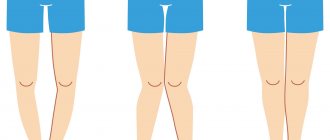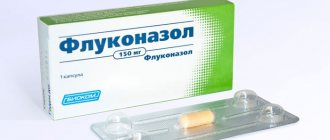Compound
One tablet may contain 250 or 500 mg of active substance.
Auxiliary components: potato starch, anhydrous silicon dioxide in colloidal form, calcium stearate.
The concentration of the active substance in 1 ml of solution is 95.5 mg. 1 ml of the drug contains 8.95 mg of total calcium (Ca2+), which in terms of the theoretical content of calcium gluconate is 100 mg/ml. The solution contains calcium sucrose and water as auxiliary components.
Composition and effect of the drug
Preparations with the active ingredient calcium gluconate are intended to treat conditions in the body that are caused by a deficiency of this mineral.
It is available in tablet form of 250 mg or 500 mg, as well as in the form of a solution for intramuscular and intravenous injection in ampoules. Calcium gluconate has several properties:
- helps reduce the manifestation of allergic reactions, and is also used for the purpose of prevention during remission;
- accelerates blood clotting;
- strengthens the body's resistance to toxins;
- suppresses the development of inflammatory processes;
- is a means of preventing and replenishing calcium deficiency.
Calcium gluconate tablets are recommended for conditions accompanied by hypocalcemia and increased permeability of cell membranes
Pharmacodynamics and pharmacokinetics
Calcium gluconate - what is it?
Calcium gluconate is a mineral supplement that is used to treat conditions caused by calcium deficiency in the body. The calcium content in the preparation is 9%. The INN (Calcium gluconate) was assigned to the active substance based on data from the European Pharmacopoeia (Ph.Eur.).
the myocardium cannot function normally , contraction of smooth and skeletal muscles, and blood clotting processes; Without them, bone tissue cannot form normally, and other organs and systems cannot function.
The gross formula of calcium gluconate is C12H22CaO14.
Pharmacodynamics
In many diseases, the concentration of Ca ions in the blood decreases; at the same time, severe calcium deficiency contributes to the development of tetany. The drug not only prevents the occurrence of hypocalcemia , but also reduces the permeability of vascular walls, relieves inflammation, has an antiallergic and hemostatic effect , and reduces exudation.
Ca ions are a plastic material for teeth and skeleton; many enzymatic processes occur with their participation; they are responsible for regulating the permeability of cell membranes and the speed of transmission of nerve impulses.
They are needed for the process of neuromuscular transmission and maintaining the contractile function of the heart muscle. If we compare calcium gluconate with calcium chloride, the latter has a more pronounced local irritating effect.
Pharmacokinetics
When taken orally, the substance is partially absorbed, mainly in the small intestine. TCmax - 1.2-1.3 hours. T1/2 of ionized Ca from blood plasma - from 6.8 to 7.2 hours. Penetrates into breast milk and through the placental barrier. It is excreted from the body mainly by the kidneys, but also with the contents of the intestines.
How to take Calcium Gluconate tablets: symptoms of deficiency
If a woman eats right before pregnancy and at the very beginning, then it is possible to completely avoid the need to drink the component in the form of tablets.
You should definitely pay attention to products in the form:
- Cottage cheese, kefir and milk;
- Fish;
- Legumes;
- Orekhov;
- Celery stalks;
- Sesame seeds;
- Barley groats;
- Sea kale.
With their help, you can replenish a pregnant woman’s calcium balance without medications, which is extremely important for the proper development of the fetus. It is especially useful to stay in the sun when consuming foods rich in calcium, since vitamin D promotes the absorption of this component.
Symptoms of calcium deficiency may vary, but in pregnant women they are all similar.
It is strictly forbidden to take medications unnecessarily, and especially without consulting a specialist.
Symptoms that may indicate calcium deficiency include::
- Unreasonable goosebumps;
- Convulsions;
- Pain in the area of bones and in particular their deformation even with minor impact;
- Deterioration of the condition of teeth, skin and hair;
- Increased fatigue;
- Anxious state;
- Increased nervousness;
- Strong excitability.
Benefits of badger fat during pregnancy: 9 benefits
Each component must be selected individually and the medicine is prescribed only after tests have been completed.
Indications for use of Calcium gluconate
What is Calcium Gluconate tablets for?
Tablets are recommended for conditions accompanied by hypocalcemia, increased permeability of cell membranes, and disturbances in the conduction of nerve impulses in muscle tissue.
Doctors answer the question “what is calcium gluconate used for?” answer that the use of the drug is advisable for:
- hypoparathyroidism ( osteoporosis , latent tetany);
- vitamin D metabolism ( spasmophilia , rickets , osteomalacia );
- hyperphosphatemia in patients with chronic renal failure;
- increased need for Ca ( pregnancy , breastfeeding , periods of intensive growth in children/adolescents);
- insufficient Ca content in the diet;
- bone fractures;
- Ca metabolism disorders in the postmenopausal period;
- conditions that are accompanied by increased excretion of Ca (chronic diarrhea , prolonged bed rest; long-term treatment with diuretics , corticosteroids or antiepileptic drugs );
- poisoning with oxalic acid, Mg salts, soluble salts of fluoric acid (the advisability of using the product as an antidote is due to the fact that, interacting with these substances, Ca gluconate forms non-toxic Ca oxalate and Ca fluoride).
As an addition to the main treatment, calcium gluconate tablets are used as an allergy remedy for itchy dermatoses , febrile syndrome , urticaria , serum sickness , angioedema ; for bleeding of various origins, nutritional dystrophy , bronchial asthma , pulmonary tuberculosis , hepatitis , eclampsia , nephritis , toxic liver damage .
Why are calcium gluconate injections used?
Calcium gluconate in ampoules is prescribed for certain pathologies of the parathyroid glands , conditions that are accompanied by increased excretion of Ca from the body, as an adjuvant for allergies , as well as for allergic complications of treatment with other drugs, to reduce vascular permeability in various types of pathological processes, for nephritis , eclampsia , liver intoxication , hyperkalemia , parenchymal hepatitis , hyperkalemic form of periodic paralysis ( paroxysmal myoplegia ), as a hemostatic agent.
Indications (intravenously/intramuscularly) for administration of the drug are also poisoning with soluble salts of fluoric acid, oxalic acid or Mg salts, for skin diseases ( psoriasis, itching, eczema ).
In some cases, Calcium gluconate is used during autohemotherapy . This method of treatment has proven itself well for skin diseases, furunculosis , recurrent colds , diabetes , rheumatism , allergies , and during the recovery period after serious illnesses.
10 ml of calcium gluconate solution is injected into the patient's vein, and then blood is immediately taken from the vein and transferred back in the form of a subcutaneous injection or injection into the gluteal muscle.
What is a hot shot?
Injections of the drug are also known as “hot injections of calcium gluconate.” In fact, the solution is administered heated only to body temperature.
A hot injection is called a hot injection because of the subjective sensations that arise in the patient: after the injection, there is usually a feeling of warmth spreading throughout the body, and sometimes a fairly strong burning sensation.
Calcium gluconate for allergies
Doctors have proven that one of the causes of allergies may be a severe calcium deficiency in the body. It is with Ca deficiency that most allergic reactions in children are associated: the child’s body grows very rapidly, and as a result, the Ca content in all its tissues decreases.
In addition, factors that contribute to the formation of Ca deficiency are excess vitamin D in the body and teething.
, calcium gluconate is often used as one of the methods for preventing and treating allergies
With sufficient calcium intake into the body, the permeability of the vascular walls decreases, and the penetration of allergens into the systemic bloodstream becomes more difficult. This means that an increase in Ca concentration is accompanied by a decrease in the likelihood of an acute immune reaction.
Calcium gluconate is used in combination with antihistamines . The drug is prescribed, among other things, to eliminate side effects caused by taking other medications.
Studies have shown that, as a source of calcium alone for the body, the calcium salt of gluconic acid is the least active, however, calcium gluconate is best suited allergic diseases
The tablets are taken orally before meals. The dose depends on the characteristics of the disease and the age of the patient.
In addition, in some cases, the patient may be prescribed intravenous administration of the solution. allergies , calcium gluconate is not recommended to be administered intramuscularly or subcutaneously (especially to children).
The course of treatment for allergies usually lasts from 7 to 14 days.
Calcium gluconate for allergies (reviews are eloquent confirmation of this) is a time-tested and quite effective remedy, which, on top of everything, is almost impossible to overdose on.
Maximum absorption of calcium is ensured with the participation of vitamin D , amino acids (in particular L-arginine and lysine) and Ca-binding protein.
Why does an expectant mother need calcium?
Expectant mothers need to constantly replenish the reserves of this element, because thanks to calcium, tooth and bone tissue are formed. The baby needs it for proper skeletal development. The element also plays a very important role in the formation of the nervous system.
Calcium ions regulate various intracellular processes - hormone secretion, exocytosis, muscle contraction. The amount of this element absorbed by the baby in the womb determines his mental and physical development after birth.
With calcium deficiency, many representatives of the fair sex experience the following symptoms: paresthesia (a feeling of “crawling goosebumps” throughout the body); muscle contraction; convulsive twitching; bone pain.
Both the expectant mother herself and her unborn baby suffer from a lack of calcium during pregnancy.
Pregnant women may experience the following consequences:
- deterioration of the condition of teeth, hair, nail plates;
- increased fragility of bones, their softening and deformation;
- severe toxicosis in the first half of pregnancy;
- the occurrence of gestosis;
- miscarriage;
- early birth;
- fast fatiguability;
- weakening of labor during contractions;
- excessive excitability, nervousness, anxiety.
Due to a lack of calcium during pregnancy, a child may experience the following problems:
- defective development of systems and organs;
- weakened bone skeleton;
- rickets.
The daily calcium requirement during pregnancy is about 1500 mg. The fetus receives 2-3 mg per day in the first trimester. Gradually this figure is growing. In the third trimester, the baby already needs more - 250-300 mg. Women after childbirth require about 2000 mg of calcium during breastfeeding.
Contraindications
Contraindications to the use of solution and tablets:
- intolerance to the components of the drug;
- severe hypercalciuria ;
- tendency to thrombosis;
- hypercoagulability;
- severe atherosclerosis ;
- calcium nephrourolithiasis;
- increased blood clotting;
- sarcoidosis;
- severe renal failure;
- period of treatment with cardiac glycosides (for example, digitalis preparations).
Side effects
The drug is usually well tolerated, but in some cases the following disorders are possible:
- bradycardia;
- hypercalciuria , hypercalcemia ;
- nausea, vomiting, stool disorders ( constipation /diarrhea), epigastric pain;
- formation of calcium stones in the intestines (with long-term use of high doses of the drug);
- impaired renal function ( swelling of the lower extremities, frequent urination);
- hypersensitivity reactions.
bradycardia , diarrhea, a feeling of heat in the mouth and then throughout the body, and changes in the skin may sometimes be observed These reactions pass quite quickly and do not require special treatment.
sweating , vomiting, arterial hypotension , and collapse (in some situations, lethal) may occur The result of extravasal penetration of the solution can be calcification of soft tissues.
In very rare cases, allergic and anaphylactic reactions .
When calcium gluconate is administered intramuscularly, local irritation and tissue necrosis .
Recommendations for taking calcium during pregnancy
The recommended dose for each mother is individual; most often, doctors prescribe a tablet 1-2 times a day. From the beginning of the second trimester until the last week before giving birth, strict adherence to medical prescriptions will prevent deficiency or overdose. 1500 mg of calcium per day should come from all sources together, not from each.
The gynecologist will determine through tests whether you need to continue taking it or whether it’s time to stop. It is usually recommended to stop taking it from the 30th to 34th week so that the bones of the baby’s skull do not lose their elasticity to pass through the birth canal, but some pregnant women have to eat calcium until the birth itself.
Important Tips:
- You cannot simultaneously take medications containing calcium and multivitamin complexes containing it. It is necessary to wait more than two hours between taking calcium and other medications;
- if side effects in the form of digestive disorders do not disappear within 24 hours and disrupt the usual rhythm of life, it is better to discontinue the drug and consult a doctor for a replacement. In case of severe tachycardia, headaches and general weakness, immediate discontinuation of the drug and a visit to the gynecologist are required;
- the presence of stones in the organs of the urinary system requires drinking at least one and a half liters of clean water daily. If renal function is impaired, it is imperative to monitor the excretion of calcium from urine using laboratory tests;
- You should drink milk and eat dairy products no earlier than two hours after taking calcium-containing medications, otherwise the absorption of the element will slow down.
Instructions for use of Calcium gluconate
Calcium gluconate tablets, instructions for use
The tablets are taken before meals, after crushing or chewing.
A single dose for patients over 14 years of age is from 1 to 3 g (2-6 tablets for each dose). Patients 3-14 years old are given 2-4 tablets. 2-3 rubles/day.
Treatment lasts from 10 days to 1 month. The duration of the course is determined by the attending physician individually depending on the patient’s condition.
The permissible upper limit of the daily dose for elderly patients is 4 tablets. (2 g).
Ampoules Calcium gluconate, instructions for use
Calcium gluconate is administered intravenously or intramuscularly.
For patients over 14 years of age, injections are given once a day. A single dose is from 5 to 10 ml of solution. Depending on the patient’s condition, injections can be given daily, every other day or once every two days.
For children from birth to 14 years of age, the dose of 10% calcium gluconate solution intravenously varies from 0.1 to 5 ml.
Before administration, the drug should be warmed to body temperature. The medicine should be administered slowly - over 2-3 minutes.
To administer less than one milliliter of solution, it is recommended to dilute a single dose to the required volume (syringe volume) with a 5% glucose solution or 0.9% NaCl solution.
Table: dietary supplements (dietary supplements) with calcium during pregnancy
| Name of dietary supplement | Release form and composition | Advantages | Contraindications | Features of the purpose when bearing children | Price |
| Calcium Active | Pills:
|
| Individual intolerance to dietary supplement components. | Prescribed as a food supplement for pregnant women suffering from osteoporosis or dental problems. | From 93 rubles per pack of 40 pieces. |
| Marine calcium biobalance: calcium-vitamin C-vitamin D – Ecomir | Pills:
|
| Allergic reaction to any of the components in the composition. | The course of treatment for pregnant women is 30 days, after which the doctor recommends stopping or continuing. There should be at least two weeks between courses. | From 106 rubles per pack of 100 tablets. |
| Calcide | Pills:
| Modern biotechnologies make it possible to preserve all the beneficial qualities of eggshells. Therefore, Calcide contains natural microelements with the addition of vitamins. | Individual intolerance to components. | The duration of the course and dosage for pregnant women is selected according to individual indications. | From 124 rubles. |
Photo gallery: Calcium supplements for expectant mothers
Patients note that Calcium Active tastes like hay
It is recommended to take Marine Calcium tablets with acidified drinks or kefir for better absorption
Vitamins D3 and C, included in the Calcid recipe, promote maximum absorption of calcium by the body
Overdose
With long-term treatment with high doses of calcium gluconate, the risk of developing hypercalcemia with the deposition of Ca salts in the body increases. The likelihood of hypercalcemia increases with the simultaneous use of high doses of vitamin D or its derivatives.
Hypercalcemia manifests itself:
- anorexia;
- constipation;
- nausea/vomiting;
- irritability;
- increased fatigue;
- polyuria;
- abdominal pain;
- polydipsia;
- muscle weakness;
- arterial hypertension;
- arthralgia;
- mental disorders;
- kidney stones;
- nephrocalcinosis.
In severe cases, coma and cardiac arrhythmia .
To eliminate the symptoms of overdose, the drug should be discontinued. In severe cases, the patient is prescribed intravenous calcitonin at a rate of 5-10 MO/kg/day. The product is diluted in 0.5 liters of 0.9% NaCl solution and administered dropwise over six hours. Slow drip administration of the antidote 2-4 times a day is also allowed.
Table: multivitamin complexes for pregnant women
| Name of the multivitamin complex | Calcium content, % of daily value | Contraindications | Features of application | Approximate price per package |
| Elevit Pronatal | 125 mg, 8.3% |
| The recommended dose is 0.5–1 tablet per day as prescribed by a doctor. It should not be exceeded; an overdose of retinol may occur. | From 732 rubles. |
| Pregnavite | 250 mg, 16.7% |
| The daily dose of the complex depends on the trimester - 1-3 capsules, but can be adjusted downward according to the doctor’s decision. | From 643 rubles. |
| Vitrum Prenatal forte | 200 mg, 13.3% |
| One tablet is taken immediately after breakfast during the planning stage and during pregnancy. The beginning and duration of the course is selected by the doctor based on test results. | From 967 rubles. |
Photo gallery: multivitamins for expectant mothers with calcium
Many women become acquainted with Elevit Pronatal at the planning stage and continue to take it during pregnancy.
Doctors advise Pregnavit not only for expectant mothers, but also for recovery after serious illnesses that provoke hypo- or vitamin deficiency
Vitrum Prenatal is prescribed to prevent deficiency of vitamins and microelements in order to avoid deterioration in the mother’s well-being and deviations in fetal development.
Interaction
A drug:
- slows down the absorption of etidronate , estramustine , bisphosphonates , tetracycline antibiotics , quinolones , fluoride and iron preparations for oral administration (an interval of at least 3 hours should be maintained between their doses).
- reduces the bioavailability of phenytoin ;
- enhances the cardiotoxicity of cardiac glycosides ;
- in patients with hypercalcemia , it reduces the effectiveness of calcitonin ;
- reduces the effects of calcium channel blockers;
- increases the toxicity of quinidine .
In combination with quinidine, it provokes a slowdown in intraventricular conduction; in combination with thiazide diuretics hypercalcemia increases . Vitamin D and its derivatives help increase calcium absorption. Cholestyramine reduces Ca absorption in the gastrointestinal tract.
Forms insoluble or slightly soluble Ca salts with salicylates, carbonates, and sulfates.
Certain foods (for example, rhubarb, bran, spinach, cereals) can reduce the absorption of Ca from the digestive tract.
Not compatible with the solution:
- carbonates;
- sulfates;
- salicylates;
- ethanol.
Calcium for pregnant women - video
Calcium gluconate is allowed during pregnancy. However, the form, dosage and maximum duration of the course of treatment are determined by the doctor. Most often it is prescribed at the end of the first trimester, and treatment continues until 30–33 weeks. In case of severe calcium deficiency, the drug may be recommended at an earlier date.
One of the indications for prescribing calcium gluconate injections is pathology of the parathyroid glands, which is accompanied by increased excretion of calcium from the body
Calcium gluconate is mainly prescribed in tablet form. According to the instructions, the drug is taken before meals. Before taking, the tablet should be crushed or chewed, and then washed down with water or milk. The daily dose is determined by the doctor.
Vitamin D helps calcium to be better absorbed, so they are often prescribed together during pregnancy
Calcium gluconate is prescribed less frequently in the form of an injection solution. Intravenous administration is recommended in emergency cases, for example, with Quincke's edema, bleeding during or after childbirth. The dosage is from 5 to 10 ml of solution. According to the instructions, the injection can be given once a day. Intramuscular injections are considered ineffective, since in this case calcium is not absorbed in the required amount.
Calcium is absorbed more slowly when taking tablets simultaneously with the following products:
- spinach and sorrel (due to their oxalic acid content);
- high fat flour and confectionery products;
- coffee and strong tea;
- sweet carbonated drinks;
- chocolate.
The consumption of these products during pregnancy should be reduced or eliminated completely.
The strange taste preferences of women in delicate situations are legendary. If the expectant mother really wants chalk or raw cereals, this may indicate the beginning of the development of iron deficiency anemia. In this case, consultation with an obstetrician-gynecologist is required, since low hemoglobin can cause oxygen starvation of the fetus.
Calcium gluconate should not be used in the following cases:
- excess mineral in the blood (hypercalcemia);
- individual sensitivity to the components of the drug;
- atherosclerosis (artery disease in which cholesterol is deposited inside the vessels);
- severe renal failure;
- increased blood clotting.
While using the drug, side effects may occur:
- nausea or vomiting;
- pain in the epigastric region;
- bowel dysfunction accompanied by severe diarrhea or constipation;
- allergic reactions caused by intolerance to the components of the drug;
- swelling of the legs;
- frequent urination.
In the last trimester of pregnancy, calcium should be taken with caution. Its excess in a woman’s body in the last stages can cause:
- loss of elasticity of the fetal skeletal system (especially for the skull bones, which do not compress during passage through the birth canal, which leads to complications during childbirth and severe ruptures of the cervix);
- failure of the kidneys (since they have to experience severe stress when excreting excess calcium);
- magnesium deficiency (with this condition there is weakness, increased anxiety, convulsions, memory impairment, pain in the heart area).
When prescribing calcium gluconate, the doctor takes into account the features of its interaction with other drugs:
- slows down the absorption of many substances, including fluoride and iron preparations (an interval of at least 3 hours should be maintained between their doses);
- reduces the bioavailability of phenytoin;
- enhances the cardiotoxicity of cardiac glycosides;
- reduces the effectiveness of calcitonin (in a state of hypercalcemia) and calcium channel blockers;
- increases the toxicity of quinidine.
Calcium must be supplied to the body of a pregnant woman for the correct and harmonious development of the fetus, as well as to maintain the health of the expectant mother. If the substance supplied with food is not enough, the doctor may prescribe calcium gluconate.
With a lack of calcium in the body, pregnant women report cramps, bone pain, and a feeling of “pins and needles” throughout the body.
We suggest you read: Is naphthyzin possible during pregnancy?
The condition of nails, hair and teeth deteriorates, bones become deformed and soften.
Severe toxicosis occurs in the first trimester and gestosis in the rest.
The woman gets tired quickly, is too excited, is in an anxious state, and is nervous.
- Helps transmit nerve impulses and contract smooth and skeletal muscles.
- Serves as a basis for bone tissue and maintains the strength of tooth enamel.
- Participates in the process of blood clotting, in the work of the myocardium, and in the secretion of adrenaline by the adrenal glands.
- Reduces vascular permeability.
- It has a blood-restoring, antiallergic, diuretic effect.
It is not calcium gluconate itself that is dangerous, but its excess.
In this case, early ossification of the fetus occurs, the baby’s bones lose elasticity, and this complicates its passage through the birth canal. At birth, the cranial bones cannot compress, and ruptures and birth injuries occur.
The kidneys have to remove excess calcium from the body. For the expectant mother, whose kidneys are also responsible for the baby, this is too much of a burden.
Calcium penetrates well into the placenta and can cause its ossification.
The drug should be taken with caution if a woman has: hypercalcemia; nephrolithiasis; hypercalciuria; taking cardiac glycosides; sarcoidosis; diarrhea and dehydration; malabsorption syndrome; electrolyte disturbances; hypercoagulability; atherosclerosis; moderate CHF, chronic renal failure; thrombosis or increased blood clotting; renal failure; hyperparathyroidism; hypersensitivity or allergy to the drug itself.
Overdose
Overdose of calcium gluconate occurs rarely and only in combination with high doses of vitamin D.
However, it causes anorexia, sleep disturbance, sweating, polyuria, thirst, vomiting, tachycardia, weight loss, increased levels of calcium, cholesterol, citrate and phosphates in the blood, decreased levels of magnesium in the blood, dehydration, muscle hypotension, adynamia, drowsiness , convulsions.
Side effects
When taken orally: irritation of the mucous membrane of the gastrointestinal tract, constipation.
When administered intravenously: fever, burning in the mouth, bradycardia, nausea, vomiting.
With rapid intravenous administration: fainting, arrhythmia, low blood pressure, cardiac arrest.
With intramuscular administration: bradycardia, nausea, vomiting, necrosis occurs at the injection site.
- Incompatible with sulfates, carbonates, ethanol, salicylates.
- Reduces the effect of tetracycline antibiotics.
- When taking veropamil, intravenous administration of calcium gluconate reduces its effect.
- When taken simultaneously with quinidine, it increases its toxicity and slows down intraventricular conduction.
- Strengthens the cardiotoxic effect of cardiac glycosides.
- Slows down the absorption of iron, digoxin, tetracyclines.
- Increases hypercalcemia when taking thiazide diuretics.
- Reduces the availability of phenytoin.
- Reduces the effectiveness of calcitonin.
- Enhances the effect of vitamin D, K, estrogens, anabolic steroids.
- Reduces the toxicity of fluorides and biosphosphonates.
About 0.3 g of calcium gluconate penetrates the placenta. For a woman, the maximum dose is 0.5 g. Calcium gluconate is prescribed to a pregnant woman in this dosage - 0.5 g.
The drug is taken until birth. However, you should not self-medicate and prescribe calcium gluconate.
Only a doctor who is leading the pregnancy and has all the laboratory test evidence, taking into account the medical history and current condition of the mother and baby, can prescribe calcium gluconate.
It is the doctor who determines the dosage and duration of taking the drug. The doctor also monitors the body’s reaction to calcium gluconate.
In the first trimester, calcium is responsible for the formation of muscle tissue, the heart and nervous system of the child, and reduces the risk of miscarriage. However, at this time, the child’s need for calcium is fully satisfied by the mother’s nutrition.
In the second and third trimesters, calcium actively participates in the formation of the skeleton and reduces the risk of premature birth
As the child grows, the mother's daily need for calcium also increases, but closer to the due date, calcium gluconate is prescribed with caution. The doctor and only the doctor weighs the pros and cons and decides on the need to take the drug.
Among the medications, doctors recommend Calcium D3 Nycomed, Calcemin, Calcium Glycerophosphate.
But only the doctor who is observing you will select the right drug for you, its dosage and duration.
Calcium is absorbed with the help of vitamin D, the main source of which is sun rays. Therefore, a pregnant woman needs frequent walks. Vitamin D is also found in butter, egg yolk, fish and dairy products.
We suggest you read: How to make friends with a treadmill
The most effective analogue of calcium gluconate is food rich in calcium.
A pregnant woman needs to drink a glass of milk a day, eat cheese, cottage cheese, kefir, nuts and legumes, fish, celery, and sesame seeds.
special instructions
Due to the possibility of developing necrosis, calcium gluconate should be administered exclusively intravenously to children under 14 years of age.
Before filling the syringe, ensure that there is no residual alcohol in it (a sediment may form).
Treatment of patients with of urolithiasis , reduced glomerular filtration rate or mild hypercalciuria should be carried out under the control of Ca2+ levels in the urine. To reduce the risk of developing urolithiasis, it is recommended to drink enough fluids.
“Pharaoh's snake” from calcium gluconate
Calcium gluconate tablets are often used by enthusiastic chemists to produce “pharaoh’s snake,” a porous product that is formed from a small amount of reacting substances.
The tablet is placed on dry fuel, and then the fuel is set on fire. A light gray “snake” with white spots begins to crawl out of the tablet. Moreover, the volume of the “pharaoh snake” significantly exceeds the volume of the original substance: for example, in some experiments, snakes 10-15 cm long were obtained from 1 tablet.
During the decomposition of calcium gluconate, Ca oxide, carbon dioxide, carbon and water are formed. The characteristic shade of the resulting snake is given by Ca oxide. The only drawback of such a “pharaoh snake” is its fragility; it crumbles very easily.
Calcium gluconate analogs and drugs that can replace it
Calcium gluconate is the simplest and most accessible source of calcium allowed during pregnancy. There are a sufficient number of drugs, including complex ones, that can replace it if for some reason (allergy to excipients) it is not suitable for a woman.
Calcium supplements allowed during pregnancy - table
| Name | Active substance | Release form | Contraindications | Use during pregnancy |
| Calcium D3 Nycomed |
| Chewable tablets in different flavors. |
| The use of calcium supplements is allowed during pregnancy as prescribed by a doctor. |
| Kalcemin |
| pills. | ||
| Calcium glycerophosphate | calcium glycerophosphate. |
| ||
| Vitrum Calcium D3 |
|
|
Calcium-containing drugs allowed during pregnancy - photo gallery
Analogs
Level 4 ATC code matches:
Calcium Sandoz Forte
Calcium Glycerophosphate
Calcium gluconate-Vial , LekT , B. Brown ; Additive calcium , Hydroxyapatite , Glycerophosphate granules , Calcium lactate , CalViv , Calcium pangamate , Calcium-Sandoz .
Calcium gluconate for children
Why is calcium gluconate prescribed to children?
In the articles, Dr. Komarovsky notes that the most common indications for the use of the drug in pediatrics are conditions caused by insufficient intake of calcium into the body from food, as well as conditions caused by impaired absorption of calcium in the intestine.
Hypovitaminosis D to the development of hypocalcemia , along with a reduced content of Ca in food . In addition, certain diseases of the parathyroid glands and thyroid gland hypocalcemia .
In addition to these diseases and rickets , indications for prescribing Ca drugs for children are allergic diseases (acute or chronic), skin diseases, pathologies manifested by blood clotting disorders, physiological conditions that are accompanied by an increase in the child’s body’s need for Ca (periods of active growth).
How to take Calcium Gluconate correctly?
For children, Komarovsky recommends dosing calcium gluconate depending on age. In the first 12 months of a child’s life, the standards for daily Ca intake range from 0.21 to 0.27 g. Children under 3 years of age require 0.5 g of Ca per day, children 4-8 years old - 0.8 g, children over eight years of age - 1-1.3 g.
As a rule, children get Ca from dairy products, greens, fruits, vegetables and nuts.
Children under 12 months are given 3 tablets per day (1.5 g), children under 4 years old - 6 tablets per day (3 g), children under 9 years old - depending on the severity of calcium deficiency and the characteristics of the clinical situation - 6-12 tablets. day (3-6 g), children under 14 years old - 12-18 per day (6-9 g).
The daily dose is divided into 2-4 doses.
The drug is usually administered intravenously to children as an emergency treatment: for bleeding, convulsions, acute allergic reactions.
The solution is not administered subcutaneously or intramuscularly to children. Medicine can only be injected into the muscle in adult patients!
Is calcium in tablets useful for pregnant women: precautions for taking them
Every pregnant woman should remember that she needs to take care of the baby first.
In particular, compliance is required:
- Correct lifestyle;
- Proper nutrition;
- Personal hygiene;
- A well-constructed plan for each day, in which there will be a place for both rest and work.
The fact that you may need to take calcium in the form of tablets is not dangerous or even harmful to health, since this is just a banal maintenance of optimal condition and nothing more, which contributes to a successful birth and normal development of the child both before and after birth.
Any fruit, vegetable, and even medicine in large quantities will begin to harm the body. This drug cannot be considered a vitamin, and you must strictly follow your doctor’s recommendations regarding consumption.
An excess of calcium can have serious consequences such as:
- Early ossification of the fetus, which will reduce elasticity and become a problem during childbirth;
- Deterioration in the throughput of the placenta, which reduces the amount of nutrients reaching the baby;
- Deterioration of the mother’s kidneys, which are already under heavy stress during pregnancy;
- Muscle hypotension, as well as severe drowsiness and decreased performance;
- Reduced amount of magnesium in the blood fluid;
- Increased heart rate in both mother and fetus.
Even if the dosage is selected correctly, and there is no violation in taking the drug, constant monitoring of calcium levels in the body is required, especially if there is not an improvement, but a deterioration in well-being during therapy. An excess of calcium can even cause the formation of plaques in blood vessels and blood clots. In special cases, a severe allergic reaction is possible, which should be reported to the doctor immediately and stop taking the medicine.
According to statistics, half of expectant mothers suffer from calcium deficiency. The growing baby takes it from the mother's body, so pregnant women need to monitor the level of the mineral, which should be enough for two. Its deficiency is expressed in the following symptoms:
- bone pain;
- convulsions, trembling;
- anxiety, nervous excitability, sleep disturbances;
- fast fatiguability;
- toxicosis or gestosis (late toxicosis);
- poor condition of teeth, hair, nails, skin;
- risk of miscarriage;
- weak labor activity.
For a baby, this can be fraught with:
- underdevelopment;
- rickets;
- overexcitability.
Under no circumstances should expectant mothers take the drug on their own. Only a doctor, after analyzing the woman’s condition and her well-being, prescribes Calcium gluconate, since its excess is just as dangerous as its deficiency. Excess calcium in the mother's body threatens to harden the placenta and change the density of the baby's skeletal bones; they will become inelastic, which will make it difficult for the baby to pass through the birth canal - this is fraught with consequences for mother and baby. Excess mineral leaves the body through the kidneys, which causes complications for them.
A lack of calcium is as dangerous for a pregnant woman as its excess.
In the first 12 weeks of pregnancy, calcium gluconate is rarely prescribed, only if the woman has a pronounced deficiency. At this time, calcium-containing foods (fat milk, cottage cheese, kefir, sour cream, eggs, hard cheese, nuts, legumes, greens) are usually sufficient.
We suggest you read: On what day can you feel pregnant?
The use of the drug begins in the second trimester, when it is necessary for the formation of the child’s skeleton. In the last three months of pregnancy, the body's need for calcium increases, because the baby is growing rapidly. But closer to delivery, it is taken with caution to avoid complications.
Normal levels of calcium in the body can be maintained through food
Sometimes pregnant women really want to eat chalk. Experts explain that this has nothing to do with a lack of calcium.
Calcium gluconate is available in the form:
- tablets;
- solution for droppers or injections.
Calcium gluconate injections are rarely prescribed, only if the lack of the mineral is dangerous for the baby
Experts believe that when calcium gluconate is used intramuscularly, the mineral will not be absorbed by the body in the required dosage. This process occurs more efficiently in the gastrointestinal tract, that is, when swallowing a powdered tablet washed down with milk or water. Intravenous administration of the drug is prescribed only in emergency cases, if calcium deficiency is dangerous for the child.
Reviews of Calcium gluconate
The most common reviews of the drug Calcium Gluconate are reviews for allergies . The drug is prescribed to both adults and very young children. At the same time, most people consider it a worthy alternative to more expensive and advertised medications.
To compensate for calcium deficiency, tablets are usually prescribed, but in some situations the drug is administered intravenously or into a muscle.
Reviews of calcium gluconate injections intramuscularly suggest that the procedure is quite painful. Moreover, unpleasant sensations usually occur not during the injection, but after it.
Reviews about calcium gluconate intramuscularly indicate that intravenous injections are tolerated somewhat easier than injections into the muscle. However, it should be remembered that the injection is “hot”, and after it you should not stand up suddenly.
Despite the pain of injections, the drug helps well with allergies , pityriasis rosea , heavy periods, persistent sore throat , herpes and a number of other pathologies. In pregnant women, after treatment with calcium gluconate, leg cramps are significantly reduced, nails and teeth are strengthened.
However, you should not forget that the product is a medical drug, so only a doctor can recommend treatment for it.
Calcium gluconate is a proven remedy for heartburn during pregnancy.
During pregnancy, a woman’s body, which is under heavy stress, sometimes “rebels.” One of these troubles is heartburn. For some, it appears for a short time, while for others it accompanies the entire period. There are an incredible number of ways to get rid of heartburn that pregnant women have tried, but one of the most effective is calcium gluconate. Many women note that unpleasant symptoms disappear within a few minutes after taking the drug. But, as already mentioned, calcium gluconate is not a vitamin, but a medicine, and it is reckless to abuse it. Therefore, it is worth knowing how to get rid of heartburn during pregnancy and in other ways.
- Follow the correct diet: small portions, chewing well, at least two hours before bedtime;
- Do not eat fried, spicy foods or drink carbonated drinks;
- Consume enveloping drinks: jelly, carrot juice, milk;
- During an attack of heartburn, eat raw carrots;
- Many people find it helpful to chew something: seeds, buckwheat, grains;
- You can drink a spoonful of vegetable oil;
- Prepare an infusion of herbs: yarrow, St. John's wort, dill, mint and plantain.
Calcium gluconate price
The price of Calcium gluconate tablets in Russian pharmacies is from 3.5 rubles. for 10 pieces. The cost of package No. 30 is 40-45 rubles. In Ukraine you can buy 10 tablets from 3.85 UAH.
A 10% solution in Ukrainian pharmacies costs from 17 UAH (5 ml ampoules, No. 10). The price of an ampoule of 5 ml (No. 1) is 1.8 UAH. In Russia, the price of Calcium gluconate injections is from 118 rubles.
- Online pharmacies in RussiaRussia
- Online pharmacies in UkraineUkraine
- Online pharmacies in KazakhstanKazakhstan
ZdravCity
- Calcium gluconate-vial solution for intravenous and intramuscular injection.
10% 10ml 10 pcs. Northern Chinese Pharmaceutical Corporation Ltd. 108 rub. order - Calcium gluconate solution for intravenous and intramuscular administration. 100 mg/ml, 10 ml, 10 pcs. Grotex LLC
RUB 203 order
- Calcium gluconate B. Brown solution for intravenous and intramuscular injection. 100 mg/ml 10 ml 20 pcs. B. Braun Melsungen AG
RUR 358 order
- Calcium gluconate solution for intravenous and intramuscular administration. 100 mg/ml 10 ml 10 pcs. JSC Novosibkhimpharm
145 rub. order
- Calcium gluconate tablets 500 mg 20 pcs. Pharmstandard-Leksredstva OJSC
33 rub. order
Pharmacy Dialogue
- Calcium gluconate (500 mg tablet No. 10) Ozone LLC
9 RUR order
- Calcium gluconate (500 mg tablet No. 10) Irbitsky Chemical Plant
4 RUR order
- Calcium gluconate (500 mg tablet No. 10)Update of PFC JSC
13 rub. order
- Calcium gluconate (amp. 10% 10ml No. 20)Braun
RUB 341 order
- Calcium gluconate tablets 500 mg No. 10 Square C
21 rub. order
Europharm* 4% discount using promo code medside11
- Calcium gluconate 10% 10 ml 10 ampEscom
RUB 141 order
- Calcium gluconate 10% 10 ml 1 amp b BraunB.Braun Melsungen AG
20 rub. order
- Calcium gluconate solution for injection 10% 5 ml 10 ampEllara LLC
106 rub. order
- Calcium gluconate 500 mg 30 tablets renevalUPDATE PFC
42 RUR order
- Calcium gluconate eco 500 mg 10 tablets Ecotex, LLC
5 RUR order
show more
Pharmacy24
- Calcium gluconate 10% 5 ml No. 10 solution PAT "Farmak", Ukraine
28 UAH. order - Calcium gluconate-Darnitsa 10% 5 ml No. 10 injection solution PrAT” Pharmaceutical company “Darnitsa”, Ukraine
29 UAH order
- Calcium gluconate 0.5 No. 10 tablets PAT "Kiivmedpreparat", Ukraine/PAT "Galichfarm", Ukraine
6 UAH order
- Calcium gluconate 0.5 N10 tablets PAT "Lubnipharm", Ukraine
2 UAH order
- Calcium gluconate 10% 10 ml No. 10 solution PAT "Farmak", Ukraine
45 UAH order
PaniPharmacy
- Calcium gluconate stabil. solution d/in. 10% amp. 5ml No. 10 Ukraine, Darnitsa
34 UAH order
- Calcium gluconate solution d/in. 10% amp. 5ml No. 10 Ukraine, Darnitsa ChAO
15 UAH order
- Calcium gluconate tab. 0.5g No. 10 Ukraine , Health
4 UAH order
- Calcium gluconate tab. 0.5g No. 10 Ukraine, Lubnyfarm
3 UAH order
- Calcium gluconate stabilized. solution d/in. 100mg/1ml 5 ml No. 10 Ukraine, Farmak OJSC
23 UAH order
show more










